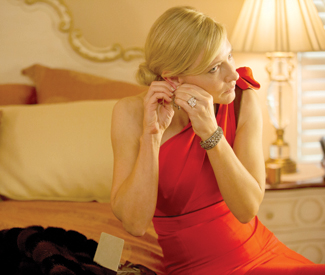arts@sfbg.com
FILM The good news about Blue Jasmine isn’t that it’s set in San Francisco — more on that later — but that it’s Woody Allen’s best movie in years. Although some familiar characteristics are duly present, it’s not quite like anything he’s done before, and carries its essentially dramatic weight more effectively than he’s managed in at least a couple decades. Yes, Match Point (2005) and Cassandra’s Dream (2007) were “serious” too, but they were basically thrillers (one pretty good, one awful) that, whatever their other qualities, demonstrated that he doesn’t have much feel for suspense.
Blue Jasmine is, in a very different way, full of tension — because its protagonist is uncomfortable in almost any situation, often teetering on the edge of a full-on anxiety attack. Yet these are recent developments. Not long ago Jasmine (Cate Blanchett) was the quintessential Manhattan society hostess, with homes hither and thither (including the Hamptons, naturally), ever-so-busy planning dinner parties, sitting on charity boards, and going to Pilates class. Her immaculately put-together elegance isn’t Brahmin-bred: a natural upscaler, she remade herself from humble roots to suit the role of picture-perfect wife to Hal (Alec Baldwin), a master of the universe type whose questionably legal investment schemes and not-particularly-discreet infidelities she turns a willful blind eye toward. (It helps that he’s a really, really good liar.)
But at the start here, that glittering bubble of money and privilege has burst — exactly how revealed in flashbacks that spring surprises up to the script’s end — with the result that marriage and material comfort are now gone. Penniless, fleeing her husband’s public disgrace (he seems Allen’s belated commentary on the bankster-induced crash of ’08), Jasmine has crawled to the West Coast to “start over” in the sole place available where she won’t be mortified by the pity of erstwhile society friends. That would be the SF apartment of Ginger (Sally Hawkins), a fellow adoptive sister who was always looked down on by comparison to pretty, popular, clever Jasmine.
Theirs is an uneasy alliance — arguably the most discomfiting flashback is to Ginger’s Manhattan visit with now ex-husband Augie (Andrew Dice Clay), a mini-festival of thinly veiled class snobbery. Ginger has good reason to resent her big sis, whose attempted financial assistance via slippery Hal actually wound up destroying the visitors’ marriage. (Allen’s casting can sometimes seem stunt-like and overdependent on “who’s hot now.” Yet its top to-bottom brilliance here is personified by comedian Clay’s excellence in a small but important role.) Still, she’s too big-hearted to say no.
Ergo, Jasmine arrives at the flat Ginger shares with her two young sons — nose immediately curling at its IKEA/thrift-shop modesty and the boys’ noisy energy — with no clear idea what she’ll do, or how she’ll support herself. She has no marketable skills, and god forbid she’d take something as lowly as Ginger’s supermarket-cashier job. Yet she continues to judge everything by standards she can no longer afford, notably sis’s new beau Chili (a terrific Bobby Cannavale), another working-class stiff who justifiably worries Jasmine will convince her she can “do better.”
Surfacing later in the SF portion of the narrative are three men who might actually fulfill that “bettering” function: Dr. Flicker (Boardwalk Empire‘s Michael Stuhlbarg), a grab-handy dentist from whom she reluctantly accepts a receptionist gig. Then at a party she drags Ginger to in order to blatantly find men of the “quality” they both “deserve,” the latter duly meets seemingly good catch Al (Louis C.K.), while the former reels in a much bigger fish in Dwight (Peter Sarsgaard), a dreamboat diplomat who’s just the ticket for a woman who’s never paid her own way in anything but trophy-wife good taste.
It’s somewhat disappointing that Blue Jasmine doesn’t really do much with San Francisco. Ginger lives in a nondescript neighborhood (near the start of South Van Ness). There are no gay characters, racial diversity is limited to background players, and good as they are, Cannavale and Clay have the kinds of personalities that yell “Jersey!” and “Brooklyn!,” respectively. There are a few shots nodding at the colorful, pretty, touristy side of the city, but that’s not the world Ginger lives or that Jasmine lands in. Really, the film could take place anywhere — although setting it in a non-picture-postcard SF (despite the warm tones of Javier Aguirresarobe’s cinematography) does bolster the film’s unsettled, unpredictable air.
Without being an outright villain, Jasmine is one of the least likable characters to carry a major US film since Noah Baumbach’s underrated Margot at the Wedding (2007), whose central dynamics (Nicole Kidman as neurotic older sister who destroyed Jennifer Jason Leigh’s prior marriage, and might now destroy her imminent second one) bear an eerie similarity. The general plot shell, moreover, is strongly redolent of A Streetcar Named Desire.
But whatever inspiration Allen took from prior works, Blue Jasmine is still distinctively his own invention. It’s frequently funny in throwaway performance bits, yet disturbing, even devastating in cumulative impact. Like Streetcar (and Margot for that matter), this is a movie as much about undiagnosed mental illness as it is about family (dis-)loyalties and class conflicts.
One of those actors who can do just about anything, Blanchett is fearless here — it’s a great role she burrows into so deeply it’s a wonder she ever came back out. Her Jasmine is cringe-inducing, terrified, superficial, unconsciously cruel. Yet she’s simultaneously so helpless that we can’t help but hope she’ll find her feet again, a rooting interest answered by the most haunting Woody Allen fadeout since 1985’s The Purple Rose of Cairo.
BLUE JASMINE opens Fri/2 in Bay Area theaters.

